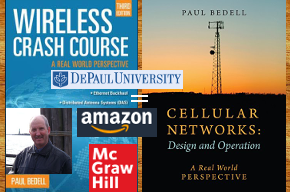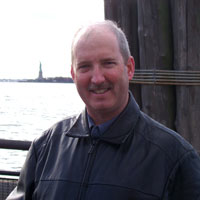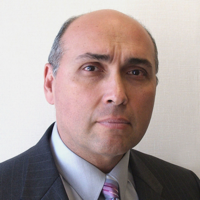
Dr. Thresher v. Prof. Bedell
November 18, 2020Dr. Thresher v. Prof. Bedell was my (Dr. Duane Thresher's) second foundational case; see IT Law Expertise in my Credentials on the Apscitu website and About Apscitu Law and Casebook on the Apscitu Law website. This case started while I was working as a network engineer at the Arctic Region Supercomputing Center in Alaska, where I did some research and work on cellular telephony (which itself involves important IT law issues). When I then started my own business, Thresher Networks LLC, in Montana, I continued this cellular telephony research, including buying from Amazon.com a just-published book, Wireless Crash Course — A Real World Perspective, Third Edition, by Paul Bedell
 , published by McGraw-Hill,
Steve Chapman
, published by McGraw-Hill,
Steve Chapman
 editor. Paul Bedell was/is a professor at DePaul
University in Chicago, in the College of Computing and Digital
Media, whose dean was/is
Dr. David Miller
editor. Paul Bedell was/is a professor at DePaul
University in Chicago, in the College of Computing and Digital
Media, whose dean was/is
Dr. David Miller
 , and used/uses the book in his
courses.
, and used/uses the book in his
courses.While reading the book, I discovered Prof. Paul Bedell had largely plagiarized it from Wikipedia. I carefully and extensively proved this copyright violation and then I reported it to the McGraw-Hill legal department. After months of arguing with McGraw-Hill, with Editor Steve Chapman running interference, I finally got McGraw-Hill to stop publishing the book, or any other book by Paul Bedell, who had already written three other books for McGraw-Hill, including the now-suspect second edition of Wireless Crash Course. (I suspect the stalling was so McGraw-Hill could try to unload its existing stock of the paper book.) A little after reporting the copyright violation to McGraw-Hill, I reported it to the DePaul University Barnes & Noble bookstore, who stopped selling it. Publishing a book is an expensive venture so stopping it, particularly just after the initial large costs, is very hard to do.
I also reported this copyright violation to DePaul University, including General Counsel Jose Padilla
 , President
Dennis Holtschneider
, President
Dennis Holtschneider
 , College Dean
David Miller
, College Dean
David Miller
 , and (a little later) University
Librarian
Scott Walter
, and (a little later) University
Librarian
Scott Walter
 , but they did nothing about it, even
though there are warnings to students all over the university
website about the severe consequences for plagiarism: "If
proven, a charge of plagiarism could result in an automatic F
in the course and possible expulsion. The strongest of
sanctions will be imposed on anyone who submits as his/her own
work any assignment which has been prepared by someone else."
Still, doing nothing was to be expected from a third-rate
university like DePaul, who would hire an IT incompetent like
Paul Bedell as a professor (see Principles
of IT Incompetence (IT Hiring: IT Incompetence Breeds
Disloyalty and Corruption)).
, but they did nothing about it, even
though there are warnings to students all over the university
website about the severe consequences for plagiarism: "If
proven, a charge of plagiarism could result in an automatic F
in the course and possible expulsion. The strongest of
sanctions will be imposed on anyone who submits as his/her own
work any assignment which has been prepared by someone else."
Still, doing nothing was to be expected from a third-rate
university like DePaul, who would hire an IT incompetent like
Paul Bedell as a professor (see Principles
of IT Incompetence (IT Hiring: IT Incompetence Breeds
Disloyalty and Corruption)).Because Prof. Paul Bedell's students could no longer buy his book, he at first made copies of this copyright-violating work available to them himself, with an ironic warning: "This material is copyrighted by the Instructor and should not be reproduced in any manner, for any distribution outside this course." Bedell then went to a vanity (self) publisher, Outskirts Press, and to this day sells the same plagiarized book
 on Amazon.com under a different
name, Cellular Networks: Design and Operation — A
Real World Perspective, and requires it in his courses at
DePaul University. Exactly what you would expect from a
corrupt incompetent.
on Amazon.com under a different
name, Cellular Networks: Design and Operation — A
Real World Perspective, and requires it in his courses at
DePaul University. Exactly what you would expect from a
corrupt incompetent.I also reported this copyright violation to the Amazon legal department, but Amazon did nothing about it. Amazon won't even allow mention of the copyright violation in the reviews on the webpage of either book, old or new. Amazon has repeatedly proved that it does not care about the legality of what it sells; see The Decline and Fall of Amazon. Amazon even continues to sell the Kindle (digital) version of the old book.
Compared to the earlier Dr. Thresher v. Prof. Dr. Lohmann, from this case I learned even more about copyright law, particularly as applicable to IT; for example, the Digital Millennium Copyright Act (DMCA). And I had reinforced the lesson to skip uselessly and endlessly arguing with all the non-lawyers involved and get right to the lawyers. Further, when this case began I was ignorant about defamation (usually libel) law, so hesitant to say anything for fear of being sued. I read up on defamation law — New York Times Co. v. Sullivan, 376 U.S. 254 (1964) and subsequent cases are the most important precedents — and then confidently proceeded. Finally, this case started to solidify my thoughts, from years of being the victim of it, about the high cost of IT incompetence.
